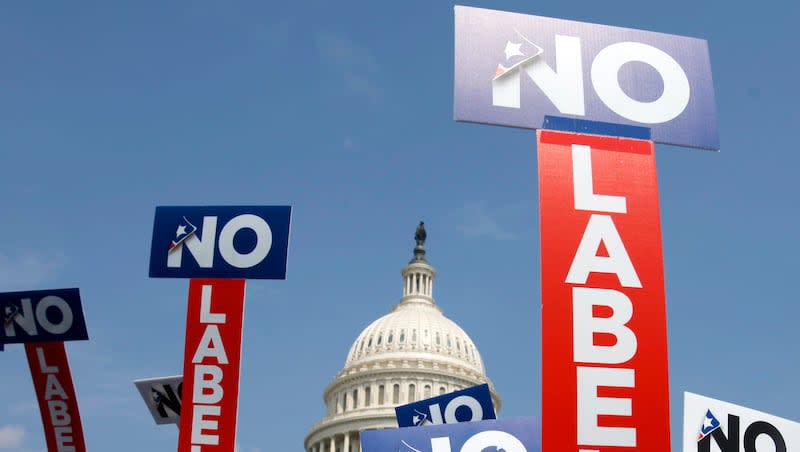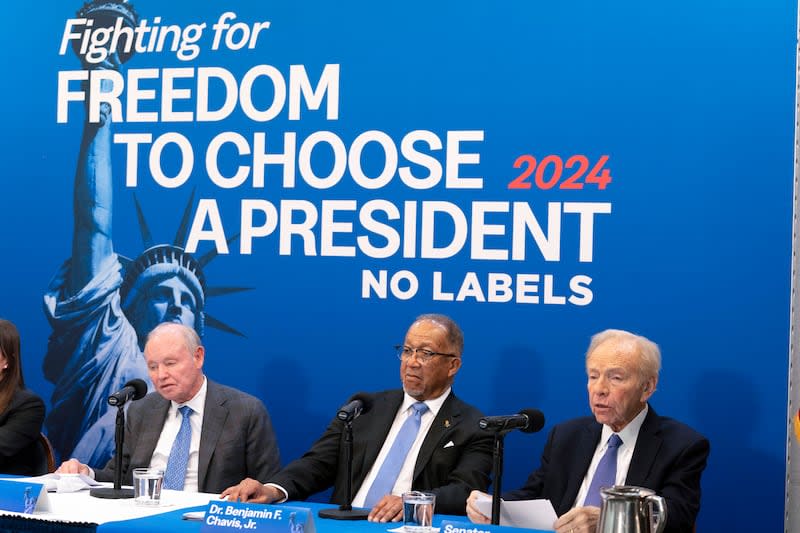No Labels is looking for a presidential candidate. Will it find one?

On Friday, the centrist political organization No Labels decided to move forward with its plans to run a “unity” presidential ticket, offering voters a third option beyond former President Donald Trump and President Joe Biden.
The question is: will they find a candidate?
No Labels delegates from across the country gathered digitally on Friday and voted “near unanimously” to “immediately ... identify candidates to serve on the Unity presidential ticket,” according to a statement by Mike Rawlings, No Labels’ national convention chair.
“Now that No Labels has received the go ahead from our delegates, we’ll be accelerating our candidate outreach and announcing the process for how candidates will be selected for the Unity Ticket on Thursday, March 14,” Rawlings continued.
But during the meeting, Rawlings admitted that a candidate may never surface. According to a recording of the meeting obtained by Politico, Rawlings left the door open for any alternative: “We don’t have a candidate,” he said, “and it’s possible, in the end, we won’t find a suitable candidate.”
The list of options is narrowing quickly. No Labels wants a candidate who aligns with its “Common Sense” policy agenda, which strikes down-the-middle approaches to issues like fiscal responsibility, immigration, abortion and military spending. But it would also need a candidate with the name recognition necessary to compete with Trump and Biden, two of the most well-known — and most disliked — politicians in the country.

“We have never seen candidates disliked this much, ever,” Nancy Jacobson, founder and CEO of No Labels, told the Deseret News in August. “If we’re going to ever create power for the center and get these two parties working together, side by side, for results for the American people, this is the moment.”
Jacobsen also told the Deseret News that No Labels was looking for a Republican to lead the ticket and a Democrat to serve as the running mate. On Friday, The Wall Street Journal reported that Geoff Duncan, the Republican former lieutenant governor of Georgia, was under consideration.
Other potential candidates have declined to run. Nikki Haley, who recently suspended her campaign for the Republican presidential nomination, would warrant “serious consideration,” said No Labels co-chair Joe Lieberman. But Haley has repeatedly shot down any speculation about third-party or independent ambitions, including in conversation with the Deseret News last week.
“I’m a Republican. You go on a No Labels ticket, what does that mean? A Democrat vice president,” she said. “That’s not who I am. I’m a conservative. I’ve always been a hardcore Republican. I think that this is about the party and this is about the country, and the only way to do it is to do it the right way.”
Other rumored candidates, like Joe Manchin and Larry Hogan, have also announced that they would not be pursuing a No Labels candidacy. Manchin, a Democratic senator from West Virginia, launched a “listening tour” across the country after announcing his intention not to run for reelection this fall, but later decided he did not want to act as a “spoiler” candidate. And Hogan, the former Republican governor of Maryland, recently announced a Senate campaign.
Two Utahns were rumored as potential No Labels candidates — but both have since said they would not run. Mitt Romney was mentioned by Manchin as a potential running mate, but Romney said he “will not be running.” And Huntsman, who appeared with Manchin last summer at a No Labels event, told the Deseret News he has no plans of running, either.
Other high-profile governors, like New Hampshire’s Chris Sununu and Iowa’s Kim Reynolds, have endorsed Trump’s candidacy.
That leaves a narrow group of moderate politicians with the requisite name recognition to launch a presidential campaign, with less than eight months until Election Day.
But just as essential as finding a candidate will be securing ballot access. Requirements for getting on the ballot are up to the jurisdiction of each state, and No Labels has a goal of getting “on 50 state ballots and the District of Columbia.” But their efforts have hit some snags: in addition to labyrinthian state laws, No Labels asserts it is the victim of “alleged illegal conspiracy” on the party of “activists and artists and party officials” who are keeping it from ballot access. No Labels filed a formal complaint with the Department of Justice in January.
The difficulty of securing ballot lines in each state may have shifted No Labels’ strategy, Politico’s Daniel Lippman notes. In an op-ed in the Dallas Morning News last week, Jacobsen wrote, “We have a strategy to get on the majority of state ballots for an independent presidential ticket,” a deviation from the organization’s previous assertion to get “on 50 state ballots.”
No Labels chief strategist Ryan Clancy stood by the group’s original goal. “If No Labels puts up a Unity ticket it will be on the ballot in all 50 states,” he told the Deseret News. “But as we have said repeatedly, No Labels will only be securing ballot access in 33 states because most of the remaining states require a named candidate to get on the ballot. The Unity ticket campaign would be in charge of getting ballot access in the remainder of the states and they would have more than enough time to do it.”